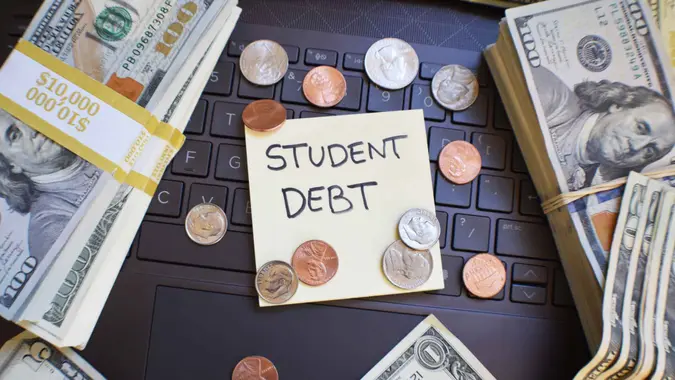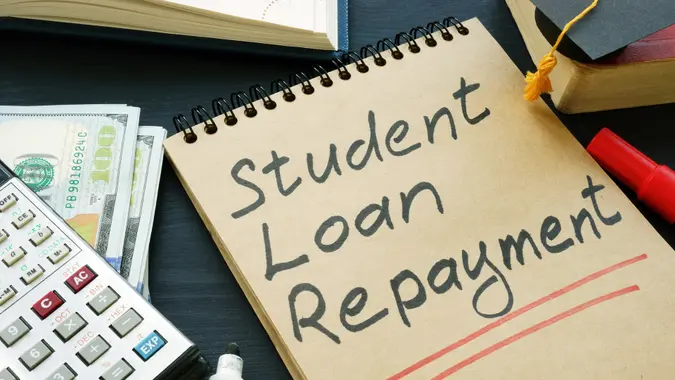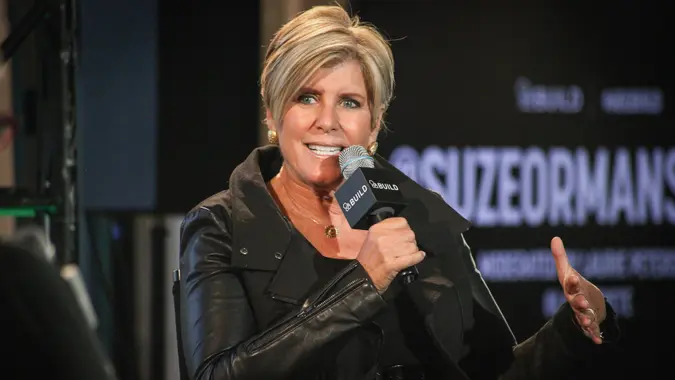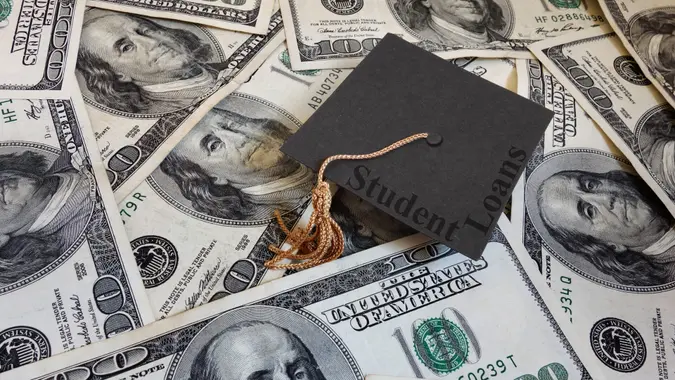I Asked ChatGPT To Explain Trump’s New Student Loan Repayment Plan — Here’s What It Said

Commitment to Our Readers
GOBankingRates' editorial team is committed to bringing you unbiased reviews and information. We use data-driven methodologies to evaluate financial products and services - our reviews and ratings are not influenced by advertisers. You can read more about our editorial guidelines and our products and services review methodology.

20 Years
Helping You Live Richer

Reviewed
by Experts

Trusted by
Millions of Readers
Because of the media’s justifiable focus on the Medicaid cuts, tax cut extensions for the rich and major increases to the deficit included in President Donald Trump and the Republican’s One Big Beautiful Bill Act (OBBBA), you might have missed the changes to student loans, which take effect for any loans generated after July 2026.
But if you or a family member are a student or future student, they might greatly affect your ability to pay for school and pay back your loans. Because bills are complicated, I asked ChatGPT to explain Trump’s new student loan repayment plan to us — below is what it said.
A Shift in the System: Out With the Old Plans
“Previously, borrowers could choose from a variety of income-driven repayment (IDR) plans. These plans adjusted monthly payments based on income and family size, often resulting in very low or even $0 monthly payments, with loan forgiveness after 20 or 25 years,” ChatGPT wrote.
The new law eliminates this tiered system, offering borrowers only two options: a modified Standard Repayment Plan and a new Repayment Assistance Plan (RAP).
“Borrowers who are currently in an existing IDR plan, such as SAVE, PAYE, REPAYE or ICR, must actively choose to switch to Income-Based Repayment (IBR) or the new Repayment Assistance Plan by July 1, 2028 or they will be automatically moved into RAP,” according to ChatGPT.
What Is the New Repayment Assistance Plan (RAP)?
The stricter terms of the Repayment Assistance Plan (RAP) are the central feature of the OBBB’s student loan reform. Monthly payments are capped at 1% to 10% of adjusted gross income (AGI), depending on the borrower’s income and household size, with a minimum payment of $10 per month — a departure from earlier plans that allowed for $0 payments.
Another key change is the timeline for loan forgiveness. The new RAP increases the time to 30 years, from 20 to 25 under current plans.
Note to the reader. Originally, ChatGPT wrote that if a borrower’s payment didn’t cover interest, it would accumulate. This could lead to compound interest skyrocketing outstanding balances and devastating consequences. I — the humble human writer — was skeptical, so I found the actual text of Section 82001 of the OBBBA, which deals with student loan repayment and uploaded it to ChatGPT. I relay this as a cautionary tale of blindly believing everything ChatGPT says. Here is the model’s answer after reading the bill text:
- Interest waiver: If a borrower’s monthly RAP payment is too low to cover all the interest that accrues that month, the unpaid interest is simply not charged. In other words, your balance won’t grow as long as you make the required payment.
- Principal “matching” credit: When a qualifying payment reduces principal by less than $50, the Department of Education will top-up the difference — up to $50 per month.
Borrowing Limits and Changes To Public Service Loan Forgiveness
The big changes came in the form of borrowing limits, something that will greatly affect future students who don’t have the money to pay for college out-of-pocket.
“Undergraduates keep the long-standing Direct Loan limits of $5,500 to $12,500 a year, with lifetime caps of $31,000 for dependent students and $57,500 for independents. However, Parent PLUS Loans are now limited to $20,000 per year and $65,000 total. Graduate and professional students can borrow up to a total of $100,000 or $200,000 for select degrees such as law or medicine,” the chatbot wrote.
These caps are particularly worrisome for low- to middle-class students. For instance, according to U.S. News and Best Colleges the average annual costs of college tuition and fees — not including living expenses, transportation and various other costs — are:
| Student / College Type | Undergraduate | Medical School |
| In-state / public | $11,011 | $161,960 |
| Out-of-state / public | $24,513 | $257,880 |
| In-state / private | $43,505 | $258,920 |
| Out-of-state / private | $43,505 | $264,680 |
These changes could result in students not being able to attend schools they worked hard to get into or send them to the private loan market, where interest rates are often higher, depending on creditworthiness and terms are less favorable.
Is It Now Harder To Repay Student Loans?
The answer is undoubtedly yes, for many.
“Economic hardship and unemployment deferments are no longer available for new loans, reducing stopgaps during hardship,” ChatGPT wrote.
The Public Service Loan Forgiveness (PSLF) program also faces changes, according to ChatGPT. “Some nonprofit and public service workers may now be excluded based on the nature of their work, particularly in fields such as immigration defense or gender-affirming healthcare for minors. This narrowing of eligibility has raised concerns among legal and advocacy groups. While RAP simplifies choices, it offers fewer borrower protections and a longer path to debt relief,” the chatbot wrote.
ChatGPT’s Last Bit of Explanation
ChatGPT said this overhaul aims to simplify repayment — but for many borrowers it also means:
- Harder access to affordable repayments.
- Higher monthly payments.
- Longer paths to forgiveness.
- Reduced support for low-income, parent or career-changer borrowers.
“If you’re currently in SAVE or another IDR plan: you’ll likely need to act before July 1, 2028 and switch to IBR, otherwise you’ll default into RAP. Existing borrowers should reassess their strategy soon,” ChatGPT wrote.
Editor’s note on political coverage: GOBankingRates is nonpartisan and strives to cover all aspects of the economy objectively and present balanced reports on politically focused finance stories. You can find more coverage of this topic on GOBankingRates.com.
 Written by
Written by  Edited by
Edited by 
























